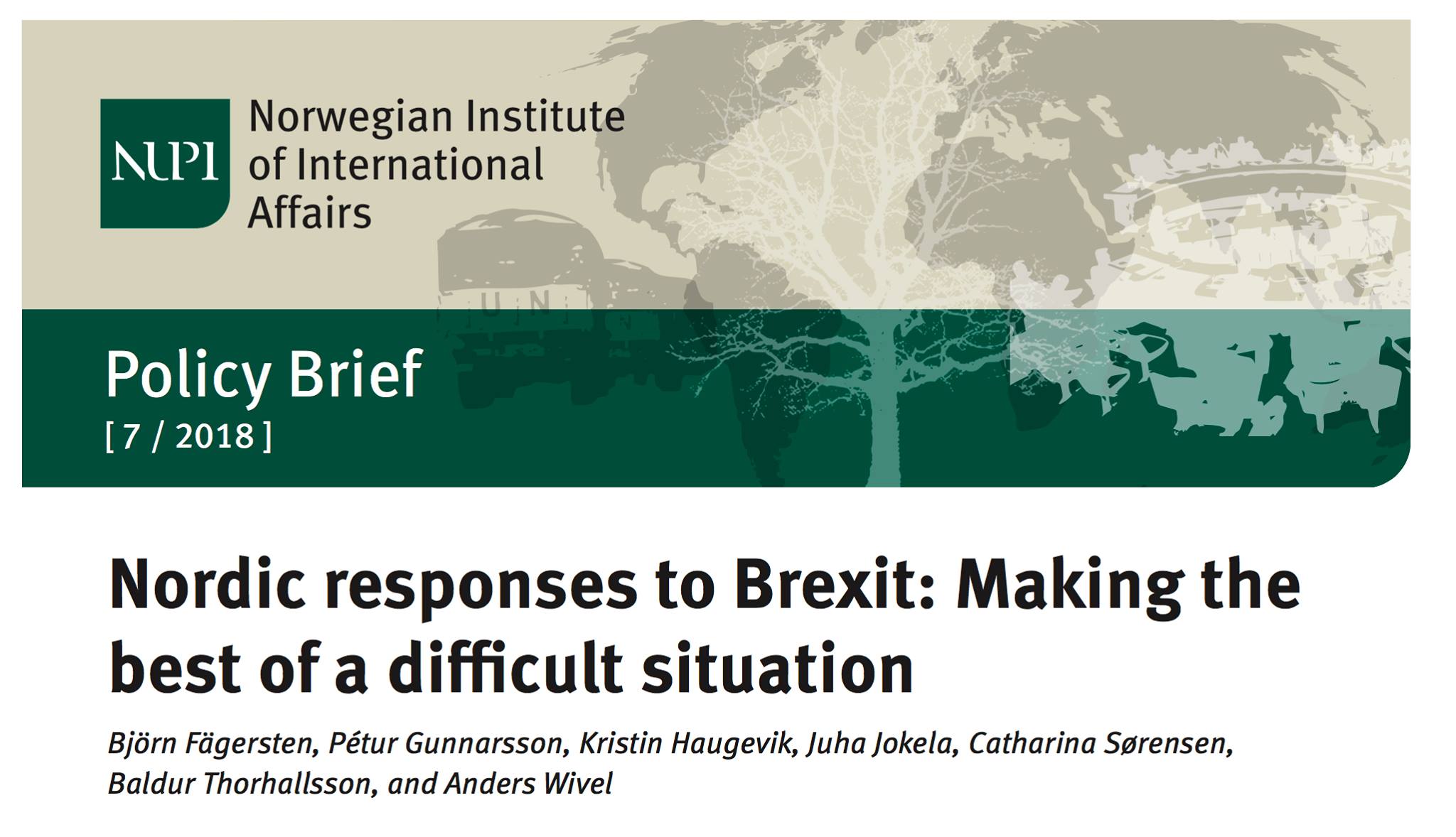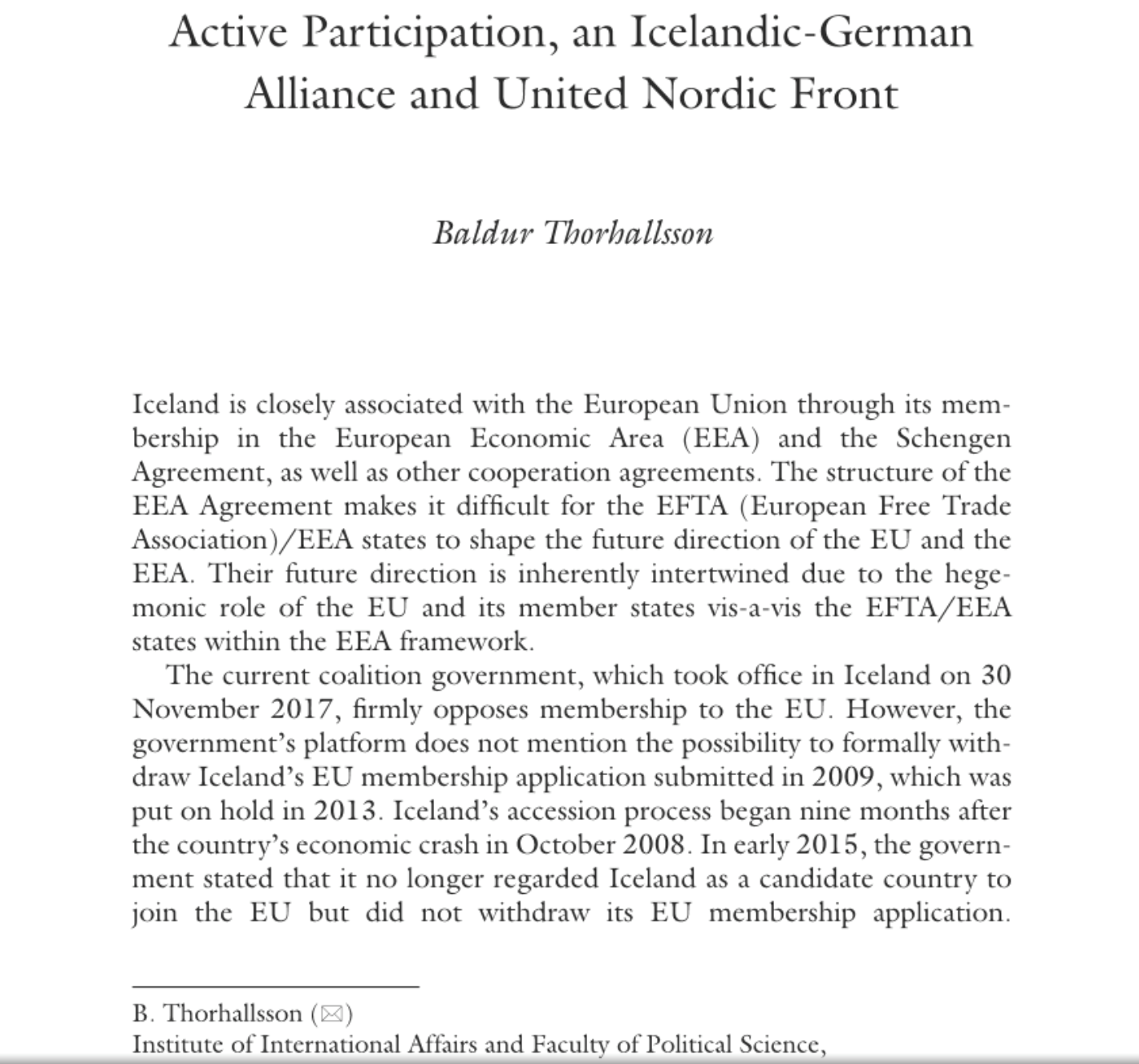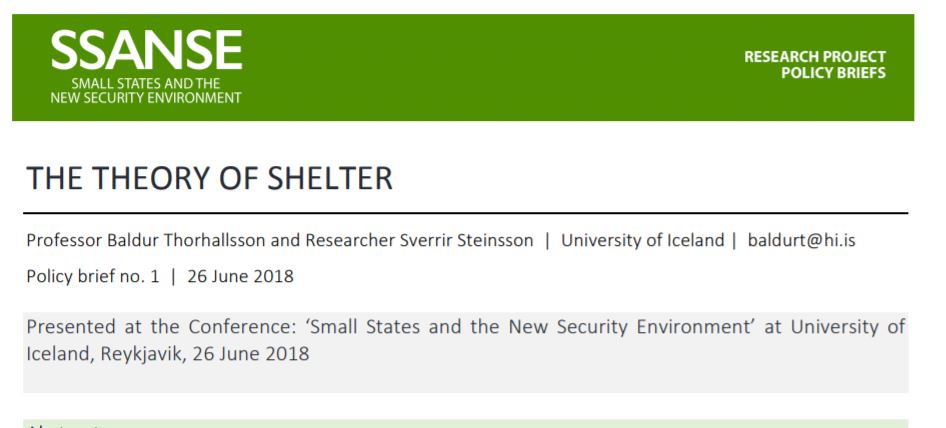Baldur Thorhallsson
Professor at the Faculty of Political Science at the University of Iceland. Baldur is also the Jean Monnet Chair in European Studies and Programme and Research Director at the Centre for Small States at the University. His research focuses primarily on small state studies, European integration and Iceland’s foreign policy. He has published extensively in international journals. He has contributed to several academic books and written two books on small states in Europe, Iceland and European integration – On the Edge and The Role of Small States in the European Union. He holds a PhD (1999) and MA (1994) in Political Science from the University of Essex in England. In 2002, Baldur established the Centre for Small State Studies at the University of Iceland in association with colleagues from around the globe and re-established the Icelandic Institute of International Affairs. He was Chair of their Board until 2011. Baldur has taught on small states at several universities and was the ‘Class of 1955’ Visiting Professor of International Studies at Williams College (MA, USA) in 2013 and Leverhulme Visiting Professor at the Queen Mary University of London in 2017. Baldur is currently working on a number of research projects related to Iceland’s external affairs, small states in European integration, and theories on small states, as well as teaching two courses on small states in Europe.
Address
Faculty of Political Science
School of Social Science
University of Iceland
101 Reykjavik
IcelandOffice in Oddi 223
E-mail: baldurt@hi.is
Tel: +354-525-5244Bookmarks
Archives
- May 2022 (1)
- April 2022 (5)
- March 2022 (4)
- February 2022 (4)
- January 2022 (2)
- December 2021 (4)
- October 2021 (4)
- September 2021 (5)
- May 2021 (1)
- January 2021 (1)
- December 2020 (2)
- November 2020 (4)
- March 2020 (2)
- January 2020 (2)
- December 2019 (1)
- November 2019 (9)
- August 2019 (2)
- May 2019 (2)
- April 2019 (1)
- March 2019 (2)
- December 2018 (1)
- October 2018 (1)
- September 2018 (1)
- July 2018 (7)
- May 2018 (1)
- April 2018 (2)
- March 2018 (5)
- February 2018 (1)
- November 2017 (2)
- October 2017 (4)
- September 2017 (1)
- August 2017 (1)
- July 2017 (1)
- June 2017 (6)
- May 2017 (6)
- April 2017 (1)
- March 2017 (3)
- February 2017 (1)
- December 2016 (2)
- November 2016 (9)
- October 2016 (11)
- September 2016 (7)
- August 2016 (2)
- July 2016 (2)
- June 2016 (9)
- May 2016 (6)
- April 2016 (3)
- March 2016 (3)
- February 2016 (4)
- January 2016 (2)
- September 2015 (5)
- August 2015 (1)
- March 2015 (15)
- December 2014 (3)
- November 2014 (6)
- October 2014 (7)
- September 2014 (3)
- August 2014 (8)
- June 2014 (6)
- May 2014 (8)
- April 2014 (10)
- February 2014 (4)
- January 2014 (2)
- December 2013 (4)
- November 2013 (2)
- October 2013 (4)
- September 2013 (3)
- August 2013 (3)
- July 2013 (14)
- June 2013 (17)
- May 2013 (9)
- April 2013 (13)
- March 2013 (11)
- November 2012 (1)
- October 2012 (3)
- September 2012 (1)
- August 2012 (2)
- June 2010 (1)
- June 2009 (2)
- July 2003 (1)
- March 2003 (1)
- December 2002 (1)
- November 2002 (1)
- October 2002 (1)
New book in the autumn
This book is coming out in the autumn. It is about Shelter 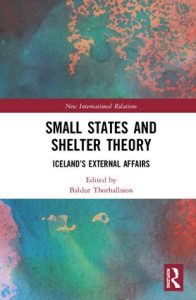 Theory, a new theory in small state studies, and Iceland’s External Affairs, from the British and American occupation in the Second World War to the present. It contains detailed analysis of Iceland’s relations with the United States, the Nordic states and the European Union. It also discusses Iceland’s shelter options in the future and its cooperation with China, Russia and Britian in a post-Brexit world.
Theory, a new theory in small state studies, and Iceland’s External Affairs, from the British and American occupation in the Second World War to the present. It contains detailed analysis of Iceland’s relations with the United States, the Nordic states and the European Union. It also discusses Iceland’s shelter options in the future and its cooperation with China, Russia and Britian in a post-Brexit world.
The research team included Sverrir Steinsson, Þorsteinn Kristinsson, Dan Devine and Tómas Joensen and the concluding chapter ‘Why Shelter Theory Matters: Ramifications for International Relations and Small State Studies’ is written by my wonderful colleagues Anders Wivel and Christine Ingebritsen.
More information Small State and Shelter Theory: Iceland's External Affairs.
New (and old) videos on the website!
New types of updates have been made to the website's pages Media and Videos/Lectures where you will now find videos from lectures and TV interviews. Here is one of the videos you will find there, it is a lecture at the Norwegian Institute of International Affairs, NUPI, bearing the same name as this paper, written a few years back:
Updates have also been made to my list of academic papers and books.
The importance of building a community
The Icelandic Student Services (FS) at the University of Iceland is celebrating its 50th anniversary. It has been a privilege to serve on its Board for more than a decade. Here you will find s short interview in Icelandic on how FS has created a community for students and staff at the University. A community is a must for each and every university:
Centenary of Icelandic independence and sovereignty
 Yesterday, Icelanders celebrated the Centenary of Icelandic independence and sovereignty. The occasion was a reminder of an hour long radio interview on the Icelandic National Broadcasting Service's Rás1, eight years ago, on the meaning of sovereignty:
Yesterday, Icelanders celebrated the Centenary of Icelandic independence and sovereignty. The occasion was a reminder of an hour long radio interview on the Icelandic National Broadcasting Service's Rás1, eight years ago, on the meaning of sovereignty:
How does Brexit affect the Nordic countries?
A recent Policy Paper, written in collaboration with Pétur Gunnarsson, Kristin Haugevik, Anders Wivel, Juha Jokela, Catharina Sørensen and Björn Fägersten, features an analysis on how Brexit affects the Nordic countries and how they are preparing for it.
Three general findings can be highlighted: "First, … [i]n all the Nordic countries, Brexit has also stirred debates about their current relationships with the EU, prompting EU critics to demand new privileges or opt-outs. Overall, however, the Nordic governments, supported by a stable majority among their populations, have signalled that they wish to preserve their EU membership or current forms of association models, with the access and benefits these provide. Second, for all the Nordic countries, securing good relations with Britain post-Brexit is a key priority, but they have generally indicated that maintaining good relations with the EU must come first. Finally, the Nordic governments are well aware that Brexit could create a vacuum in EU policy-making, perhaps tipping the balance among internal clusters. Britain has been a highly visible member of the ‘Northern’ grouping in the EU, and its absence is likely to be noticed. As the Nordic countries are about to lose what has at times been a powerful ally in EU decision-making, they may have to forge new coalitions to safeguard their interests."
The Policy Paper is accessible, in full, here.
The Future of Europe - View from Reykjavík
The forthcoming book from Palgrave Macmillan, The Future of Europe: Views from the Capitals, sheds light on the political dynamics within the EU member states as well as Iceland, Norway, Switzerland and Turkey. The book features analysis from authors from all the respective states on how their country could get more involved in the European debate, "taking the reader on a journey through various political landscapes and different views. The chapters cover issues ranging from a perceived lack of ambition at the periphery to a careful balancing act between diverse standpoints at the geographical centre." Anxiety regarding national sovereignty, the migration and border discourse, security concerns as well as the obvious need to regain trust and create policies that work, are among common themes that emerge throughout the book's diverse chapters.
The chapter on Iceland, Active Participation, an Icelandic-German Alliance and United Nordic Front, concludes: "Icelandic governments have failed to engage in the European debate on the future direction of the EU and the EEA. A new active strategy is needed in order for Icelandic political (including security and defence) and economic interests to be taken into account in discussions on Europe’s future. A new threefold strategy which would consist of making changes to policy-making at home and active engagement abroad, an Iceland-German alliance, and a united Nordic front could improve Iceland’s performance on the future direction of the EU and the EEA.”
The core elements of our new Shelter Theory
Explaining the behavior of small states in the international system
Two books will shortly be published on Shelter Theory and Iceland’s external affairs from the Settlement to the present day. In our latest Policy Brief on the theory of shelter states we claim that: “...small states/entities will seek economic, political and societal shelter, and that their prosperity will be strongly linked to the nature and depth of shelter provided by larger states and/or international organizations. Shelter theory differs from other Internation Relations theories in several ways. Most notably, small states are fundamentally different units from large states. Second, the alliance choices that small states make not only serve to ensure their security, but may also have roots in domestic pressures to obtain the resources needed to achieve a successful, functional society. Third, small states benefit disproportionately from membership in international organizations as compared with large states. Fourth and fifth, small states seek partnerships with other states and alliances to achieve the resources needed to run efficient administrations and also to get the social and cultural relationships needed to keep their societies vibrant. On the other hand, such shelter does not, of course, come without costs.”
You can read the Policy Brief in full by clicking here.
Iceland's relations with the USA and the Nordic states
This article is predicated on the assumption that small states need economic, political and societal shelter in order to prosper, and applies this theory to the case of Iceland in the period 1941–2006 – from the American occupation of Iceland to the closure of the US military base in the country.
It argues that American assistance was crucial for the prosperity of Iceland during the period between 1941 and 2006, by providing extensive political, economic and societal shelter. Nordic cooperation provided a comprehensive societal shelter. Iceland also found shelter within international organizations (such as the UN, NATO, IMF and World Bank) and the norms of the international system.
In terms of societal shelter, the Americans played an important role in transferring norms, lifestyles and ideas, but the Nordic countries remained important providers of societal shelter during the period under study, keeping in line with historic precedent. The Nordic countries cooperated extensively in social and cultural affairs, allowing Nordic nationals to take up employment and settle down across borders, travel across borders without passports and claim social security on the same basis as the nationals of the state in which they are living. Icelanders continued in large numbers to pursue education in the Nordic countries.
Nevertheless, American shelter did not come without costs and controversy.
The paper is available online A Theory of Shelter: Iceland's American Period (1941–2006), with Scandinavian Journal of History, published online 15 May 2018.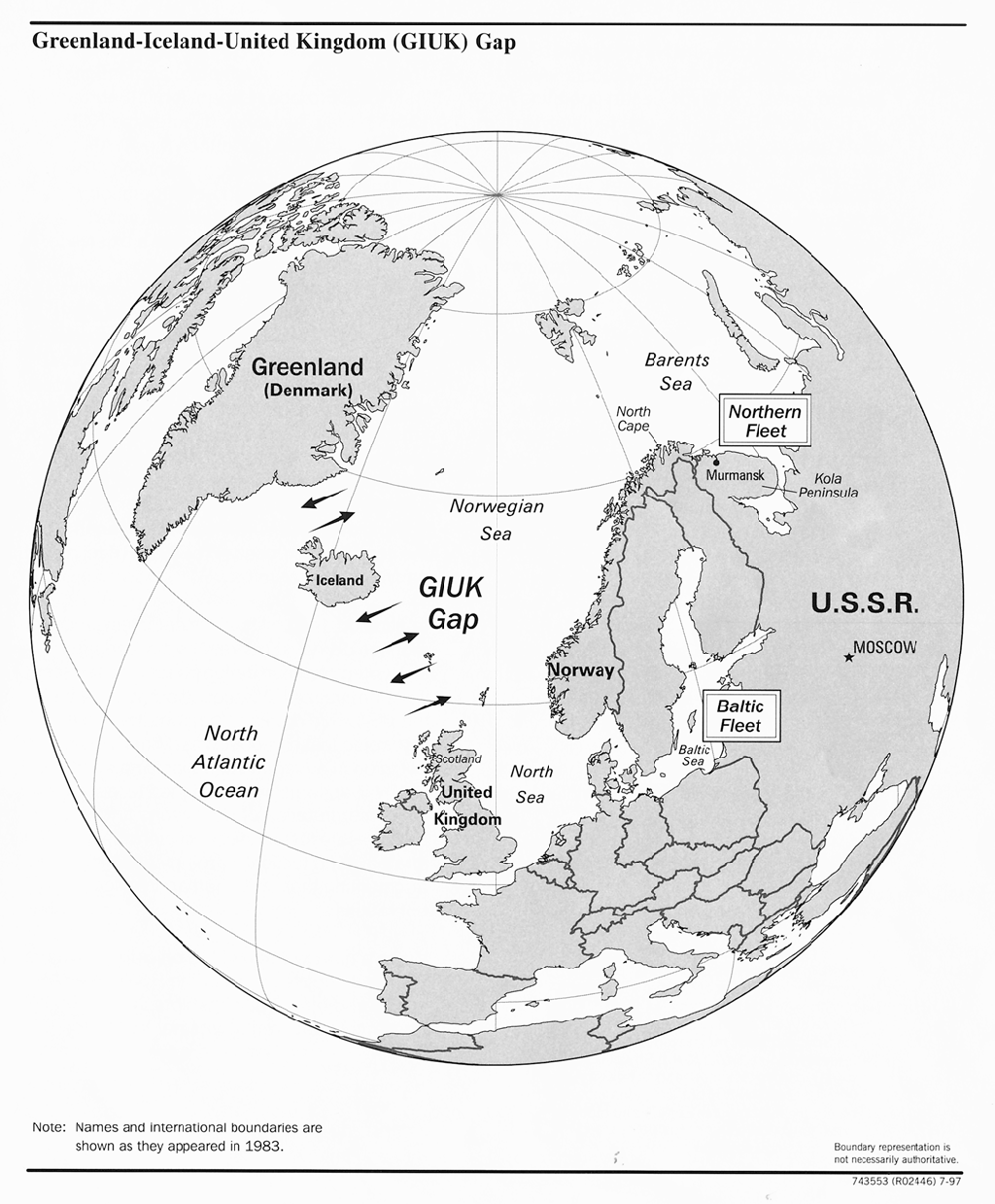
Studying small states: a review
Inaugural issue of Small States & Territories, a timely new academic journal initiated and edited by Godfrey Baldacchino. My article in the journal offers an overview of the development of small states studies. 'Studies of small states have never been as relevant as today, especially in the wake of the record number of small states and with more small territories seeking, or in a position to consider, independence. Scholars of small states have challenging and exciting times ahead.’ 



